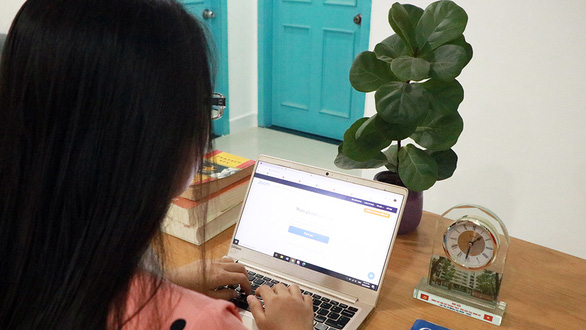Vietnamese students who have cut short their studies abroad to return home amid the COVID-19 pandemic are finding themselves struggling to keep up with class schedules in foreign time zones.
Dao Thien Thanh, an IT student at the University of Houston in Houston, Texas returned to Vietnam in August to seek safety from the global pandemic that is ravaging the United States.
Though Thanh was able to sign up for a fully online course, her decision to study remotely precludes her from re-entering the U.S., as per a newly-introduced federal law.
But a physical location is the least of Thanh’s concerns.
Right now she is more concerned about keeping up with a class schedule based-on the time in Houston.
As Houston follows Central Standard Time (CST), Thanh is 11 hours ahead of many of her classmates, meaning she has classes that meet via Zoom at 10:00 pm, 11:30 pm, and 4:00 am (Vietnam time) on various days throughout the week.
“My classes really tire me out since I still have a lot of work to do during the daytime," she explained.
"Having an exam late at night or in the early morning is the worst.
"[I have to] study during the day, revise in the evening, and show up on time to take the exam late at night.
"It’s nearly impossible to keep myself awake.”
Other Vietnamese students enrolled in foreign universities have found ways to cope with the topsy-turvy schedules.
N.T.N.H., a psychology student at Perdue University in Indiana, explained that she only logs into her online class sessions for a class roll and to complete a quick assignment before logging off and taking a nap prior the next session.
In her free time, she reviews recorded videos of the lectures she has missed to ensure she stays on track.
Disrupted experiences
H.’s method might work well for university students, but high school students who have returned to Vietnam from abroad have found themselves facing an entirely different battle – being present at a computer nearly continuously from 9:00 pm to 3:00 or 4:00 am each weekday.
As most classes have fixed rosters of 15-25 students, teachers can easily keep track of absent students.
Nguyen Bao Khang, once a 10th grader at Silver Creek High School in California, decided that due to the strenuous schedule, combined with the fact that an online learning experience did not seem to justify the US$15,000-$16,000 tuition fee each semester, he would transfer his studies to the American International School in Ho Chi Minh City.
Despite facing reverse culture shock in terms of classmates, language, class workloads, and teachers, Khang is still happy with his choice.
“I’m rather content as I get to stay in Vietnam and be with my parents," he said.
"I’ll stay here if the pandemic continues, otherwise I’ll go back abroad.”
Like us on Facebook or follow us on Twitter to get the latest news about Vietnam!


















































